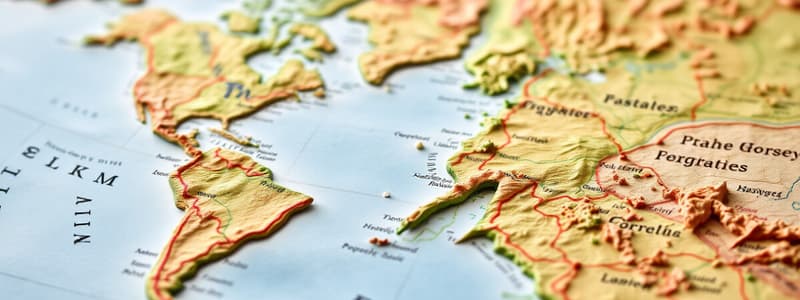Podcast
Questions and Answers
What does the term 'space' refer to?
What does the term 'space' refer to?
- A type of landscape
- How things are arranged on the earth's surface (correct)
- The study of planets
- The area where sports are played
What examples can define 'place'?
What examples can define 'place'?
Forests, towns, cities, bedrooms, schools, houses.
What does 'interconnection' mean?
What does 'interconnection' mean?
Rain creates rivers bringing people together; electronics connect people globally.
What factors contribute to 'change' in the environment?
What factors contribute to 'change' in the environment?
What elements are included in the definition of 'environment'?
What elements are included in the definition of 'environment'?
What are the three divisions of 'sustainability'?
What are the three divisions of 'sustainability'?
What issues can 'scale' address?
What issues can 'scale' address?
Flashcards are hidden until you start studying
Study Notes
Space
- Encompasses sports, learning, towns, cities, housing, and businesses.
- Three key components:
- Location: The physical positioning of things on Earth's surface.
- Organisation: The arrangement of these entities by human activity.
- Spatial Distribution: The patterns and shapes formed on the Earth's surface.
Place
- Relates to natural features such as forests, trees, and landscapes.
- Includes human-made environments like towns, cities, bedrooms, schools, and houses.
Interconnection
- Highlights the relationship between rain and rivers, which provide fresh water and support food production.
- Illustrates how technology (e.g., phones, internet) connects people globally, creating a worldwide market.
Change
- Driven by natural phenomena like climate shifts, volcanic activity, and erosion through running water.
- Involves human-induced changes such as new constructions and land clearing for agricultural purposes.
Environment
- Comprises various ecosystems, including grasslands, deserts, forests, oceans, and mountains.
- Encompasses human settlements: cities, towns, suburbs, and agricultural land.
Sustainability
- Branches into three categories:
- Environmental: Practices such as recycling and the use of renewable energy (solar, wind).
- Economic: Considerations like pensions and financial security.
- Social: Aspects including public healthcare, access to free education, and voting rights.
Scale
- Examines the impact of severe droughts on national levels.
- Recognizes the global implications of climate change and rising sea levels.
- Addresses local effects caused by increased electricity use and potential power shortages.
Studying That Suits You
Use AI to generate personalized quizzes and flashcards to suit your learning preferences.




